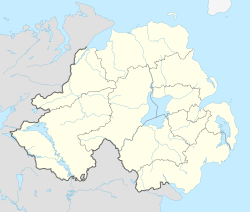Thiepval Barracks
| Thiepval Barracks | |
|---|---|
| Lisburn | |

Thiepval Barracks
|
|
|
Location within Northern Ireland
|
|
| Coordinates | 54°31′27″N 06°3′6″W / 54.52417°N 6.05167°WCoordinates: 54°31′27″N 06°3′6″W / 54.52417°N 6.05167°W |
| Type | Barracks |
| Site information | |
| Owner | Ministry of Defence |
| Operator |
|
| Site history | |
| Built | 1940 |
| Built for | War Office |
| In use | 1940-Present |
| Garrison information | |
| Occupants | 38th (Irish) Brigade |
Thiepval Barracks in Lisburn, County Antrim, is the headquarters of the British Army in Northern Ireland and its 38th (Irish) Brigade.
The barracks were built of brick in 1940. They are named after the village of Thiepval in Northern France, an important site in the Battle of the Somme and site of the Thiepval Memorial to the Missing of the Somme.
From 1954 the barracks contained the operational headquarters of No 31 Belfast Group Royal Observer Corps who operated from a protected nuclear bunker on Knox Road within Thiepval Barracks. Converted from a 1940s anti-aircraft operations room (AAOR) the bunker would support over one hundred ROC volunteers and a ten-man United Kingdom Warning and Monitoring Organisation warning team responsible for the famous four-minute warning in the event of a nuclear strike on the UK. The ROC would also detect radioactive fallout from the nuclear bursts and warn the public of approaching fallout. The two organisations were stood down at the end of the Cold War.
In early 1970 the barracks also became home to 39 Infantry Brigade and provided the headquarters for the Ulster Defence Regiment. The Brigade, as 39 Airportable Brigade, was involved in The Troubles in Northern Ireland, eventually taking on responsibility, under HQ Northern Ireland, for an area including Belfast and the eastern side of the province, but excluding the South Armagh border region. From September 1970, it was commanded by (then) Brigadier Frank Kitson.
...
Wikipedia

